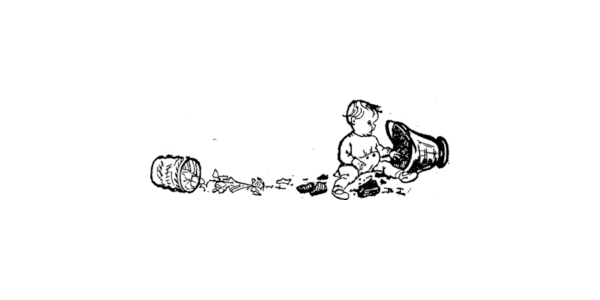
Basic Housework without Domestic Staff: Finding Joy in the Everyday Chores
Housework without Domestic Staff: Explore the insightful book chapter titled ‘Housework & Hints,’ written by Beryl Irving, the grandmother and great-grandmother of the founders of Irving Scott. This chapter is an extract from ‘The Family Weekend Book’ that offers valuable insights and practical tips on managing household chores without the assistance of domestic staff. Beryl’s own illustrations accompany the text, adding a personal touch to the reading experience. Delve into this engaging chapter and discover how to find joy and efficiency in everyday housework.
- General Hints, The Kitchen Fire, Old-time Hints
- General Hints
- Keeping Butter Cool:
- To Mend a Zinc Pail:
- Persian Rugs:
- To Remove Ink Stains:
- To Clean a Polished Table:
- To Clean Aluminium:
- To Renew a Varnished Front Door:
- To Clean Marble:
- If you run out of Baking-powder:
- Furniture Polish:
- Polish for Linoleums:
- Grass Stains:
- To Clean Enamelled Bath:
- Burnt Saucepans:
- To Wash Feather Pillows:
- Drawers that Stick:
- Tar Stains:
- Clocks:
- Peeling Onions:
- Economical Floor Stains:
- To Clean Neglected Brass:
- To Clean Stained Piano Keys:
- Mildewed Linen:
- To Stiffen the Bristles of a Soft Brush:
- To Exterminate Flies:
- Moths:
- Glass Polish:
- Discoloured Glass:
- To Clean Windows:
- To Clean Pewter:
- Steel and Iron:
- Loose Picture Frame Nails:
- To Remove Verdigris:
- A Cracked Lavatory Basin:
- A Choked Drain:
- Dyeing Materials:
- Re-hanging Clean Net Blinds:
- Flower Bowls which are not Watertight:
- Sharpening Carvers:
- To Freshen Flowers:
- The High Chair:
- To Mend Earthenware:
- To Clean Knife Handles:
- Paint – to remove spots:
- To Polish Damp Shoes:
- To Darken Tan Shoes:
- Creaky Stairs:
- Stair Pads:
- Beating Upholstered Furniture:
- In Frost:
- Mahogany Table:
- Bottle-Stoppers
- Egg-spoons
- Glycerine
- Chimneys on Fire:
- Gilt Frames:
- Paint-Brushes:
- Wet Marks on Brown Gloves
- Tortoise-shell, to polish:
- To Launder Lace and Net Curtains:
- Woollies:
- Chamois Leather Gloves:
- The Kitchen Fire
- Old-time Hints
General Hints, The Kitchen Fire, Old-time Hints
Suppose you awake one morning to the ghastly realisation that for some reason or another there are no servants today.
After the first stunned moment you leap, or should leap in a blitzlith sort of way, out of bed. The blood should then come surging back after the shock, bringing in its course a thousand thoughts on how to speed up the housework, get it done thoroughly and still be an entity by the end of the day. You make an early cup of tea; that puts you in the pot-valiant state of mind known as “going to show ’em.” Now is the time to emulate those efficient women who send their daily time-tables for publication to those periodicals which cater chiefly for mothers.
Now as to the housework. You rush round telling yourself that it all goes to show what servants could do if they really worked. By this time you are in a fever heat. Your blood is on the boil, the engine is working full bore; tidying, separating toys into boxes – no, not the pointed iron things there – thirty shillings for an X-ray last time and baby had not swallowed it after all – now there is a feeling of pressure in the head; oh for a funnel on top through which one could let out surplus steam like a railway engine! – but how surprised the baker, if one were still whistling on top when one opened the door…!
Tidy, tidy; fill husband’s cigarette-box on desk to show him you can still think of those deft, womanly touches now I’ve tipped ink into it – never mind, he’ll be glad for me to get another bottle after that clogging one…
The Second Day Housework Without Domestic Staff:
The servants are still in hiding or perhaps it is Mary Jane’s close season; anyway, she’s not there, and is the spring in your limbs still there?
The common round seems very common this morning. Bed making, the Hoover, washing-up, what a bore! Let’s break the monotony by doing the beds before breakfast as a surprise or me when I come upstairs after breakfast. Yes, dear, I did them for me as a surprise… Now what about that washing-up? I left it all in boiling water downstairs, and so long as it isn’t left more than about ten minutes it will almost have done itself by the time I get down again. But if I forget it there will be a basin full of cold grease to tackle.
A little zip returns with the using of the electric cleaner. You improve the shining hour by having competitions with yourself. Can you prove your mother-in-law wrong when she says that these new-fangled cleaners are more bother than they are worth? Can you vacuum the Persian rug from a rumpled mass into the correct flatness without stooping once to straighten it? If you can, that’s fifty: to you; and although you lose twenty for picking up hairpins in the machine which temporarily put it out of action, you gain one hundred for getting round the room without once having to switch off. And if you can total a modest seven hundred by the end of the week (if you have to carry on solo so long) you are entitled to buy yourself a new hat.
There are many articles in the daily papers which give you advice on speeding up the housework. Sometimes they seem to take for granted the fact that you are a village idiot and cannot think for yourself. Write to Auntie Proo’s Buroo and she will tell you how to pack a box for going away; how to powder your nose; how to wash yourself; and how to furnish your house out of “those old tin cans” you have thrown away and put the entire dustbin to some practical use. One can picture her house full of patent gadgets made out of something else.
We cannot give you here any of these bright brain waves for using some things for other things, but here are some general tips which will help in the work.
General Hints
Keeping Butter Cool:
Place the bowl of butter in a soup plate of water, cover with a clean flannel, the ends of which should be kept trailing in the water.
To Mend a Zinc Pail:
Putty up the hole with a small piece on the inside, a large piece on the outside. Press well and leave in the oven till dry. Enamel bowls and basins can be similarly treated.
Persian Rugs:
should not be sent to the cleaners. Wash over at home with salt and water, when their colours will come up like new ones and the sheen be restored:
To Remove Ink Stains:
- From boards: Sprinkle with a fair amount of salt and rub hard with a cut lemon.
- From fingers: Scrub with vinegar, then wash in the ordinary way.
- From materials: Soak at once in milk; after an hour or two wash out in warm soapy.
- From carpets: Blot up as much as possible, then pour milk on the stain and proceed as above.
- To Scour Boards: Use one part of lime to three parts of fine sand with a wet scrubbing brush; rinse well afterwards.
To Clean a Polished Table:
Wipe with a wash-leather wrung out of vinegar and warm water, then polish.
To Clean Aluminium:
Never use soda. Use ordinary warm water, and for a saucepan steel wool. If badly stained, boil up rhubarb or apple peel in it; this is an excellent cleaner.
To Renew a Varnished Front Door:
Mix in a pail of warm water half a cupful of linseed oil and half a cupful of turpentine. Wring out a cloth in this mixture and wipe over the door. Leave to dry, then repeat with another cloth, omitting the water, then polish.
To Clean Marble:
Stir sufficient whiting into a handful of soda dissolved in a pint of boiling water to form a paste. Spread over marble, leave for a few days, then wash off, and polish.
If you run out of Baking-powder:
Mix six ounces of bicarbonate of soda with four and a half ounces of tartaric acid, and just over one ounce of ground rice. Pound all together and bottle closely.
Furniture Polish:
Pour half a pint of boiling water over one ounce of shredded white wax and half an ounce of castile soap, stand by the fire, then add half a pint of turpentine and half an ounce of methylated spirit. Be careful not to mix the turpentine near a flame.
For dark wood, mix a tablespoonful each of vinegar, methylated spirit, linseed and turpentine.
Polish for Linoleums:
Wash in warm soda water, then apply a mixture of four ounces of shellac to a pint of methylated spirit.
Grass Stains:
Damp the stain, then apply cream of tartar. On white flannel trousers, tub with black treacle then wash in the ordinary way.
To Clean Enamelled Bath:
Ordinary paraffin is best, but wash the bath over well before using.
Mildew on Book Covers: Rub with oil of lavender and a soft rag.
Burnt Saucepans:
Fill the pans with two or three handfuls of salt in water and leave for a few hours, then bring slowly to the boil.
To Wash Feather Pillows:
Empty, the feathers into an old pillow-case or cotton bag, then wash in a large receptacle containing a strong lather of soap to which a little ammonia has been added. Press feathers well down; leave to soak; press constantly; then rinse in several waters; hang out to dry, and shake when passing.
Drawers that Stick:
Rub the sides with soap.
Tar Stains:
These can be removed by applying benzine and rubbing gently. At the end of the procedure rub hard with a dean cloth. Oil of eucalyptus is a strange-sounding cure, but often proves more efficient than anything else.
Clocks:
A hint for cleaning a clock in a dusty atmosphere. Place a wrung-out wad of cotton wool and paraffin under the works, or lay the clock face upwards over the wad (with the back of the clock off). The fumes of the paraffin will dislodge the dirt.
Peeling Onions:
Peel under a tap of running water; the fumes will not get in your eyes or make your hands smell.
Economical Floor Stains:
Permanganate of potash dissolved in water; or Brunswick black mixed with turpentine; any quantity. You can also add linseed oil to Brunswick black, but it takes-a long time to dry.
To Clean Neglected Brass:
Boil the articles, if small enough, in a mixture of soap and ammonia for fifteen to twenty minutes. If large, rub with lemon, then rinse and when dry polish with your usual brass polish.
To Clean Stained Piano Keys:
Either vinegar and water will clean them, or rub them with a paste of lemon juice and salt.
Mildewed Linen:
Make a paste of starch, lemon juice and yellow soap. Apply to the affected parts and leave in the open overnight.
To Stiffen the Bristles of a Soft Brush:
Dissolve a little alum in hot water and clip the brush up and down in it. Repeat the process several times with fresh alum.
To Exterminate Flies:
Spray the kitchen air with weak lysol and water. Protect your eyes during the process and of course make certain that food, is first covered.
Moths:
To get rid of these pests soak a rag in turpentine and place in any box or drawer where moths might collect. Repeat the process monthly. If they have already taken possession of a drawer, clean it thoroughly with turpentine, even allowing some to flow into the cracks. Then put it out in the sun to dry.
Glass Polish:
Mix just under half a pint of paraffin with about half a pint of methylated spirit. Stir in enough whiting to make a thick paste; shake well. To use smear over surface with a soft piece of stuff, then polish with another soft cloth.
Discoloured Glass:
Wash well in soapy water, and rinse. Then mix one part of salt to two of vinegar and put in the glass decanter or other receptacle to be cleaned. Let stand a few hours, when the marks should easily wash off. Or tea-leaves, used similarly, sometimes answer as well.
To Clean Windows:
Paraffin added to the water will make them shine brilliantly, or rub them with moistened news papers, or use the glass polish mixture above.
To Clean Pewter:
Antique pewter can be dipped in hot water in which wood ashes have been placed, then rubbed with a handful of silver sand. Then rinse and polish with a soft cloth, holding the article with the gloved hands.
Chromium-plated Articles merely need warm soapy water and perhaps a little rub with a paraffiny cloth.
Steel and Iron:
If rusty, rub with emery-paper and then use a turpentiny rag. Strong hot soda water helps. Very rusty articles should be greased down with mutton fat for two or three days and then worked upon.
Loose Picture Frame Nails:
If the plaster is cracked around fill the hole with liquid glue then replace the nail. In some hours’ time the nail will hold firmly.
To Remove Verdigris:
Use unslaked lime, applying it by means of a thick pad of cloth.
A Cracked Lavatory Basin:
With a fine paint-brush work some japanner’s gold size into the cracks, then make a paste of white lead and gold size and force into the cracks with a knife. Clean off the surplus putty thus formed before it hardens.
A Choked Drain:
First try boiling soda water, bucket after bucket, then try a quarter of a pound of lye from an oil shop. Dissolve in boiling water and pour down the drain. If the stoppage is not due to grease, try a force pump. In the last resort if there is a screw that can be unloosed in the U-bend of the pipes beneath the basin or sink, undo that and let the mess out into an empty pail beneath it. On re-screwing, it is advisable to put some white lead round the screw to prevent leaking.
Dyeing Materials:
Use very lean vessels, and keep stirring all the time. Damp your article up first. Make your dye up darker than you wish, as the finished articles to be dyed dry lighter.
Re-hanging Clean Net Blinds:
The hem often sticks because of the starch used and it is difficult to run the rod through. If you place a thimble on the end of the rod you can push it through easily without fraying the net.
Flower Bowls which are not Watertight:
These can be made non-porous by running candle grease over the inside.
Sharpening Carvers:
If you have no grindstone or carborundum the window-sill, if of stone will do equally well.
To Freshen Flowers:
Flowers that have arrived by post will freshen up like human beings if you place half an aspirin in the vase which holds them.
The High Chair:
The baby’s chair and tray frequently get very messy in the corners from his first efforts to feed himself. An old tooth-brush is invaluable on these occasions, as it will get into all the crevices of the tray.
To Mend Earthenware:
If possible, soak the article, then wipe off surplus moisture, and stop hole with a mixture of plaster of paris and white of egg. It is more easily done when you first stick a piece of paper over the hole on the outside, which can be removed when the putty has hardened.
To Clean Knife Handles:
Apply a paste of french chalk and lemon juice; leave it on for some hours the wash off quickly.
Paint – to remove spots:
- On Clothing: Use turpentine at once.
- On Hands: Use turpentine, or for a cellulose enamel use petrol.
- On the Floor: Mop up instantly, then polish at once.
- For Delicate Fabrics: Try chloroform but don’t put yourself out in the process.
- All paint spots need instant treatment.
To Polish Damp Shoes:
Add a little paraffin to whatever polish is used and they will come up quite well.
To Darken Tan Shoes:
Rub with ammonia, then polish.
Creaky Stairs:
Drive a few nails into the tread where they will enter the rising wood.
Stair Pads:
If you cannot afford stair pads beneath the carpet, several layers of newspaper will do as well.
Beating Upholstered Furniture:
Lay a damp cloth over the article to be beaten and the dust will then be caught by the damp cloth.
In Frost:
Be certain that all your taps are turned off tightly, it is the dripping tap which freezes. Wrap your cold water tank in sacking or something similar, and bind up pipes outside, particularly those which have bends. It is the bend which often causes the trouble.
Mahogany Table:
Rub marks caused by hot plates at once then use linseed oil on it. Vinegar and water in equal proportions will clean and polish it.
Bottle-Stoppers
which refuse to open should be grasped with a piece of emery-paper and will then turn quite easily.
Egg-spoons
which have tarnished should be rubbed with salt or ammonia.
Glycerine
left soaking on stained woollies will frequently remove the marks if the garment is afterwards washed in the ordinary way. Linen can be similarly treated.
Chimneys on Fire:
Throw a shovelful of salt on the fire.
Gilt Frames:
To remove tarnish rub with cut lemon, then sponge with warm water to which a pinch of bicarbonate of soda has been added.
Paint-Brushes:
These can be softened to vinegar by simmering them.
Wet Marks on Brown Gloves
can be removed by rubbing with methylated spirit.
Tortoise-shell, to polish:
Apply vaseline, then polish with a soft cloth.
To Launder Lace and Net Curtains:
Shake first to free from dust. Then dissolve your soapflakes in boiling water, add tepid until just nice and warm. Immerse your lace and leave to soak for a short while, then dip up and ·down repeatedly without squeezing until the dirt is expelled. Dry in the open air.
Woollies:
There are two ways of washing these.
- You can immerse them in soapflakes so hot that you can barely hold your hand in them washing quickly, squeezing, but not wringing, and then rinsing in tepid water. I should never dare to do this myself, but I know several people who do it with success.
- The more general way is to prepare your soapflakes as for lace so that they are just gently warm. Then put in your woollies and gently squeeze about, but never twist and ring. Rinse in several tepid waters, and to the last rinse, if the woollies are not to go next your skin, add a little soap. This will make them beautifully soft. Do not hang to dry if you prize the shape of the woolly. Lay flat on a towel, shaping the garment well. Dry in the open if you are sure the colour will not fade, otherwise indoors. Some people dry the woollies between two towels for three days in the winter, and then hang. They are always nicer if ironed.
Chamois Leather Gloves:
Place on hands, and wash in warm soapflakes, then squeeze all surplus soap out but do not rinse. Finish by twisting in a towel, then hang to dry, after blowing out the fingers.
The Kitchen Fire
You wrestle with the range, you cover it with coal and dust each time you make it up. You sweep in the muck from the top. It looks suddenly clean again; hope rises. Power is yours. You have made the range to go. It crackles. It roars. Slowly the pipes get hot. You sing; you thump the pans about; you turn the little handle towards the oven – the oven gets warm – you beat your chest like Tarzan; energy bubbles; you Must bake! you must fill the oven with Things. Pies: lovely words reminiscent of Pepys, you will make great “pyes.” “Pyes” with strange fillings that you have never contrived before. What if the family are all puffed out afterwards? Pies rule the day. The morning wears on. The oven is less exuberant, less hysterical now. It cools down (but not too much), it cools to do its job. You must utilise that lovely warmth to the last. Fling in the baked or to-be-baked custard – make oatcake that can cook on and on until the oven is cold without hurting. Throw in the apples for baking, stuffed with brown sugar, and standing in a little water. The mornings gone, the custard is cooked, the apples are cooked, the oatcake won’t hurt. The Pies are cooked. The frenzy is over and to what purpose?
Old-time Hints
(Eighteenth Century)
To Wash Small Cloaths:
Wash your Gawse, Cambrick, Muslin or Kenting, in milk warm water, then dry ’em, then blend your starch with powder blown in it and boil it till it comes to the consistency of glue; to a pint of the starch put three or four drops of the sweet oyl while it is boiling, and let it boil three or four wambles after, then rub the starch in the dry cloaths with your hand, and clap ’em, and clear ’em till they’re quite dry. Don’t smooth them till they are quite dry.
To Dye Gloves Purple:
Take, one ounce of fresh chips of logwood, put it into a pint of water and let it simmer on a slow fire, till a fourth par is consumed, then strain it, and put the size of nutmeg of Roche Allum into it and let it boil on the fire until it is a deep purple colour. Don’t dip the gloves into it but rub it on with a brush.
To Wash Silk Stockings:
Boil a pretty thick lather of soap and water, wash your stockings in it, blue ’em, turn the wrong side out, dry them immediately by the fire and smooth ’em; don’t leave ’em out in the air by any means ’tis that turns ’em yellow if they are very dirty boil’ em.
To Dye Gloves Lead Colour:
A quarter of a pound of tobacco pipe clay, half an ounce of indigo, a quarter of an ounce of ivory black and a little alum dissolved in a pint of salt-water, all these must be ground together on a smooth stone with a smooth stone such as the painters use to grind their colours, when it is about the thickness of hot flummery, rub it on the gloves with a soft brush and let ’em dry, then rub ’em very well till the rough colouring is off as it will be very dirty; when they are well dusted and cleaned gum ’em with a sponge dipped in a gum made of kid leather boiled till the water is thick. This must not be rubbed on till it is cold.
To Colour Purple:
Boil the worsted very well in alum water, add a pound of logwood to four pounds of worsted, twopence worth of white stone boiled with the logwood, and blend the colour with salt water and a pound of alum to four pounds of worsted.
To Dye Linnen Yellow:
To sixpence worth of turmeric and fourpence worth of saffron put six quarts of boiling water, let it stand forty-eight hours and then put in your linen letting it stand twenty-four hours then take it out and dry it by the fire make some starch of the yellow water, and when it is dry, starch it. It must be dry when you put it in the turmeric.




